African Grey parrots are among the most popular parrot kinds for “adoption.” When looking for a distinctive talking parrot, many people choose an African Grey due to its pretty coloring and friendly nature.
If you are in search of a bird yourself, you should definitely consider this exotic bird. So, let’s cover the basic African Grey parrot info so you can make a deliberate decision.
Size and Color
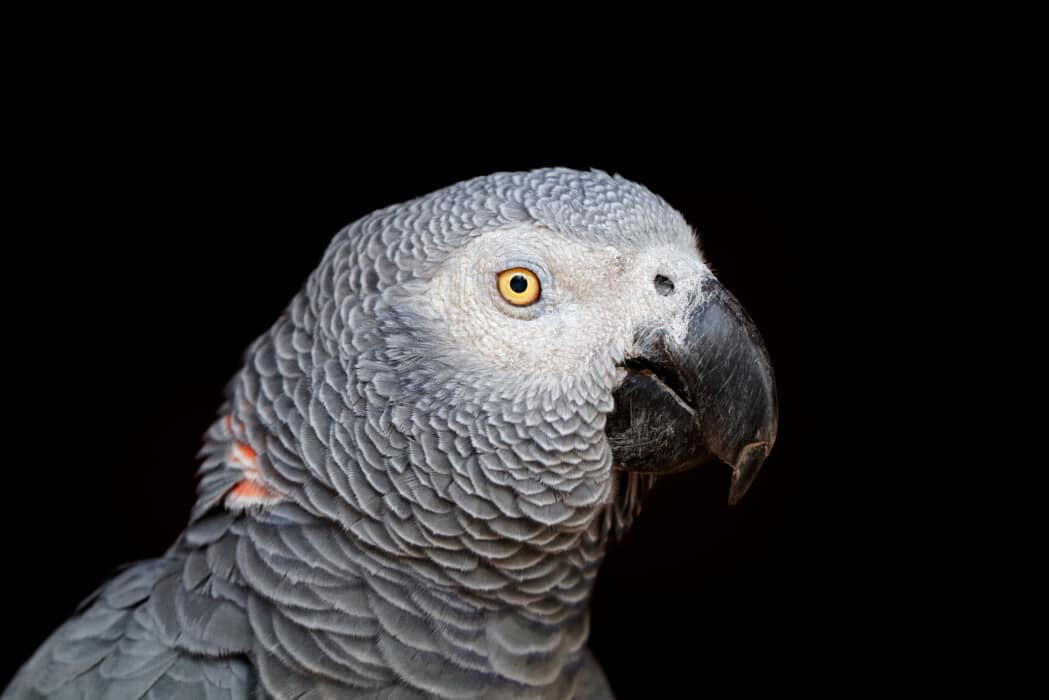
The first thing you assess this parrot for is its visuals. An African Grey is a beautiful bird with a unique coloring for parrots, well, GREY. This is one of the rare occasions when grey can be considered among the prettiest colors. Plus, it has a bright splash of red on its tail!
African Grey is bigger than many other popular pet parrots but is far from being the biggest parrots out there.
Their length is about 13 to 14 inches, and they weigh about 14 ounces. As with many parrots, females are a bit smaller than males.
Such an impressive seize requires an appropriate cage comfortable for the bird.
African Grey Lifespan
Overall, African Grey parrots live for 40 to 60 years. This is the lifespan of birds living in captivity. However, these parrots live half this age in the wild due to the harsher environment and other issues.
At home, a parrot’s lifespan depends on its health issues. In general, parrots are susceptible to digestive problems, certain viruses, etc. Thus, regular vet visits are advised even if your bird seems healthy to an untrained eye.
An African Grey pet can become your lifelong companion if you take good care of the bird!
Habitat
The native land of African Grey parrots is equatorial Africa. They are used to living in tropical jungles and hot climates. Thus, these parrots do not take well to very low temperatures and enjoy quite a bit of sun year-round. The species is found inside a range from Kenya to the eastern part of the Ivory Coast.
African Grey do sometimes escape or are released in the wild and can comfortably live in the southern regions. However, there is no evidence of them breeding in these instances.
Parrots usually require a somewhat constant temperature throughout the year. So place the cage not far from the window but preferably on the less noisy side of the house. Plus, although your parrot will require plenty of sun, it also has to have cooler shade available at all times.
African Grey Personality
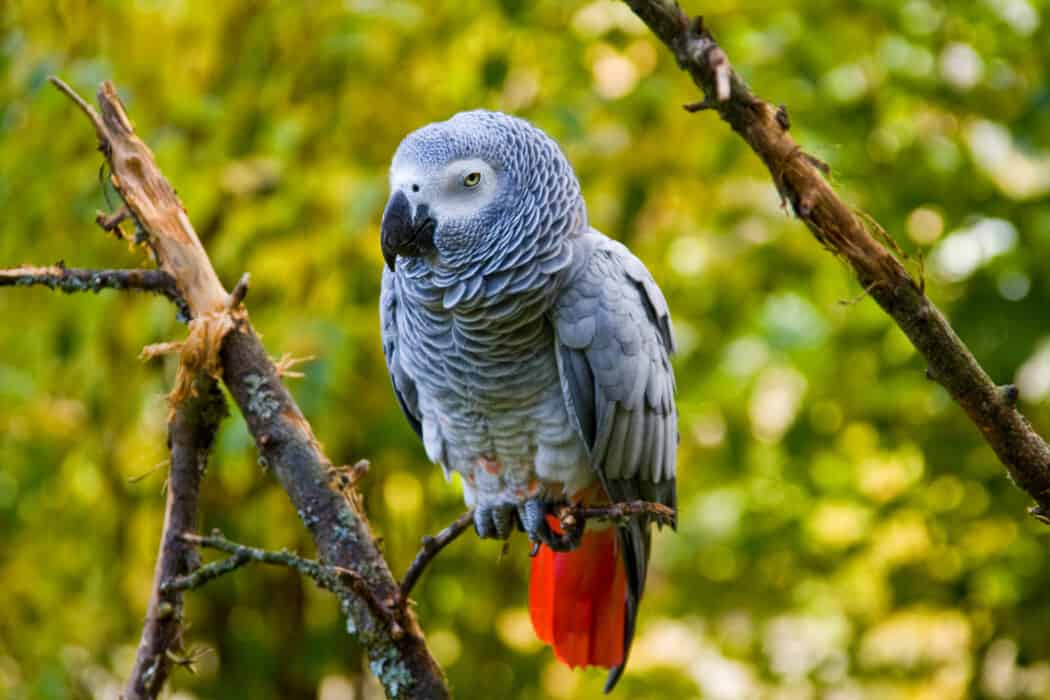
Personality-wise, I prefer African Greys the most. Even though I’m a big fan of parrots and would probably enjoy the company of any parrot type, African Grey are universally loved and would suit the beginner parrot owners well.
There are a few advantages of African Greys that any family would love. I’m sure!
Intelligence
First of all, African Grey parrots are insanely intelligent, especially in comparison with other pet animals. And they are highly regarded for their intelligence, even among parrots.
Obviously, they are talking parrots and can do that quite well. Many studies have shown that their cognitive abilities match those of 4-6 human children!
Interestingly, these parrots can correlate your voice with the face and will recognize you even if you call them from another room.
African Grey parrots can learn up to 1000 words! Plus, some studies have shown that parrots can also give new labels to the objects they don’t know by mixing the words from their vocabulary, e.g., “banerry” (“banana” + “cherry”) for “apple.”
These parrots like some mental stimulation, including learning new words and phrases and solving puzzles.
Social Skills
African Grey parrots are social birds and require regular communication with their owners. They will gladly dance or talk with you! However, they are not the most social type of parrots. They are more independent and can mentally thrive only if given enough “me” time. So, I wouldn’t suggest these birds to huge families with many young children pestering the bird 24/7.
Ideally, they can become best friends with one other pet of yours. You’ll be surprised how well they interact and sing together with dogs.
Caring
Another thing that’ll surprise you is the caring side of this pet. African Grey is a compassionate bird who loves its owner much. It will stay your loyal companion for years unless you treat it horribly. It can hold grudges and does it with passion. If you upset your bird, you’ll notice it spending more and more time alone and refusing the playtime.
However, if you take good care of it, your parrot will like gentle cuddles!
Feeding
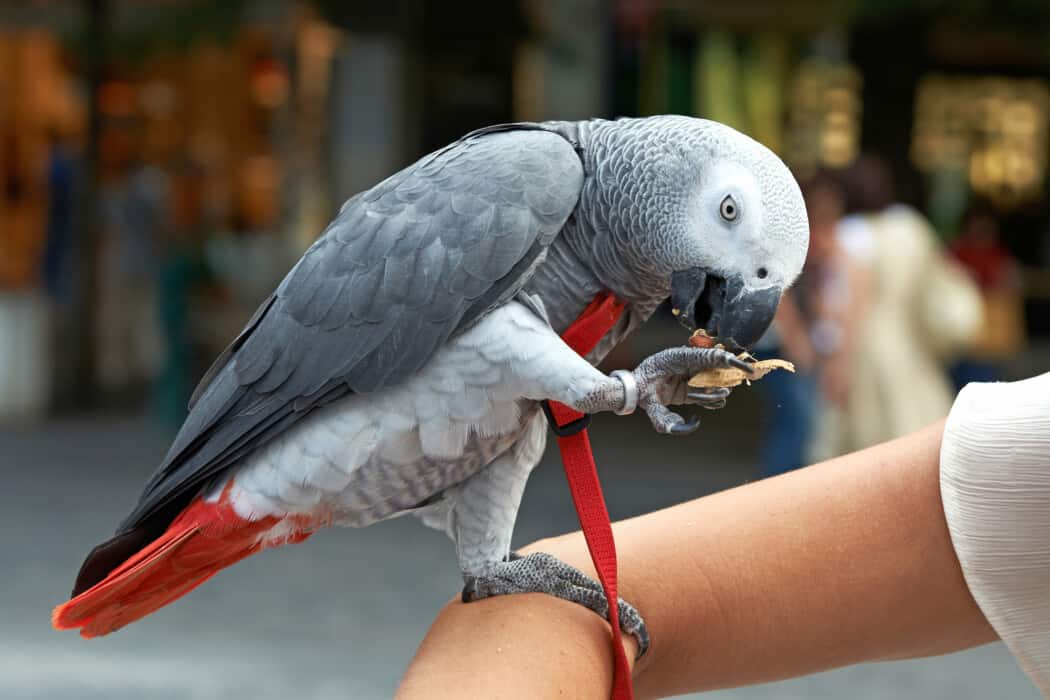
Feeding is one of the most important tasks for the owner. Parrots have sensitive digestive systems and require a balanced diet to keep their health in check. Unhealthy food leads to many severe conditions that can even result in death. This is why I devote so many articles here to the topic of food and how to feed your birds.
Remember that around 60-70 percent of the daily ratio should take up specialized pellets. The rest goes for vegetables, fruit, seeds, and nuts. Of all these, give preference to veggies and greens. Nuts, seeds, and fruit are all tasty treats and contain lots of healthy nutrients. However, they are also high in calories and can lead to obesity (and diabetes as a result) if given without moderation.
If you notice your Grey refusing to eat or being constantly hungry, you should make an appointment with your vet. It may be as simple as providing incorrect portions or a serious health issue.
Can African Greys Eat Cheese? (Food to Avoid)
Caring for an African Grey Parrot
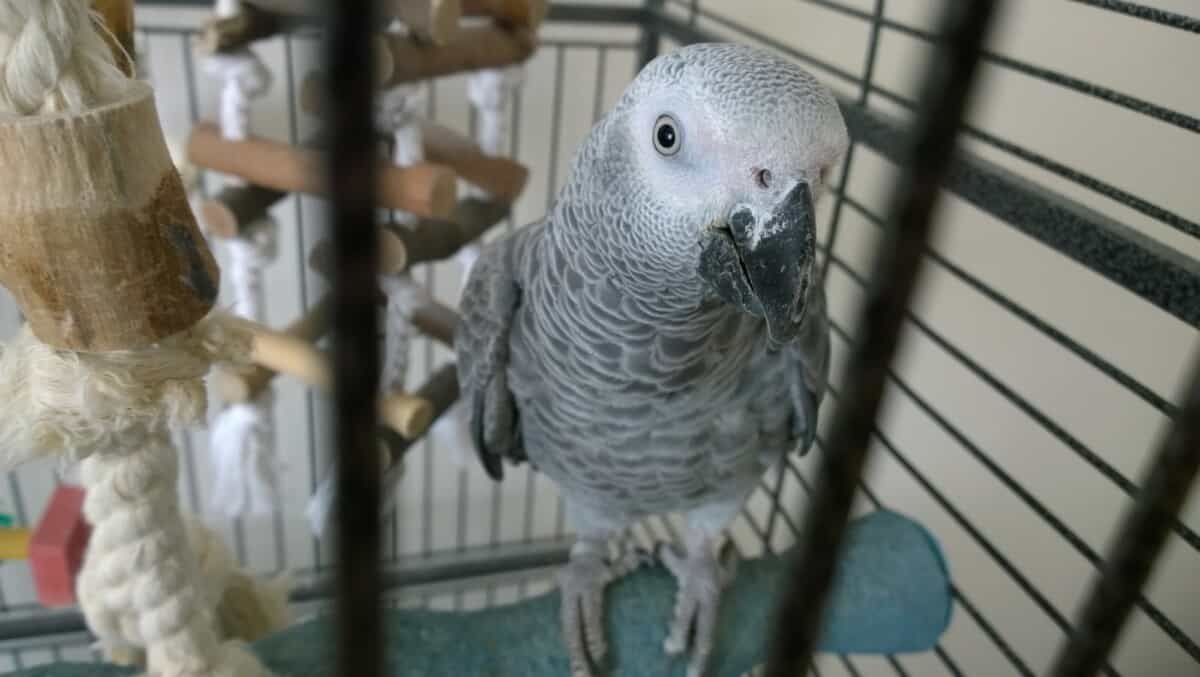
Parrot care is a simple task if you know what to do. It takes a short amount f time to find what a parrot likes and dislikes and how much attention it needs. After that, you are set for years with a routine! This brings me to the first point I want to highlight.
Routine
Chaos is not for African Grey parrots. They prefer a schedule for their daily routine, at least some kind of resemblance to it. I’m not suggesting doing everything at certain times on the dot. Just bring stability to its life, e.g., feeding early in the morning, playing in the afternoon, and some learning time in the evening.
Cage Care
First of all, choose the appropriate cage for your parrot. I’ve already created a guide on how to choose a cage for African Grey. Check it out. In short, it has to be spacious and sturdy enough for a bird of a decent size.
Then, you should clean it properly and regularly in the years to come. If your cage comes with a removable tray, cleaning will be much easier for you. You don’t need many supplies, but you’ll use them regularly to keep the cage clean and ward off bacteria.
Light, Air, and Warmth
This point is packed with the things your parrot needs in your home.
I’ve already mentioned that your parrot needs light during the day but not the direct scoring one. It should have a shaded side of the cage to hide from the sun if needed.
Plus, the bird needs fresh air (you do too), so air the house regularly but don’t put the bird in drafts. Parrots are native to tropical climates and will not do well in cold weather or content drafts. Thus, make sure your house is warm for the bird, and that the temperature is relatively stable throughout the year.
If needed, put a heater but not right beside the cage as parrots don’t like dry air.
All these temperature and light changes may affect your parrot’s health.
Time Outside
No matter how big your parrot’s cage is, you should offer it enough time outside of it regularly. Your bird needs to stretch its wings properly and fly! Just make sure to close the windows as the parrot may fly away.
Plus, the playtime should also be spent outside the cage. Bring your bird’s favorite toys, turn on music, prepare new words to learn, and even cuddle with your pet during this time. The Grey will appreciate free time outside spent with its family. And it’ll have great fun flying around the room as well.
How Much Does An African Grey Cost?
In Conclusion
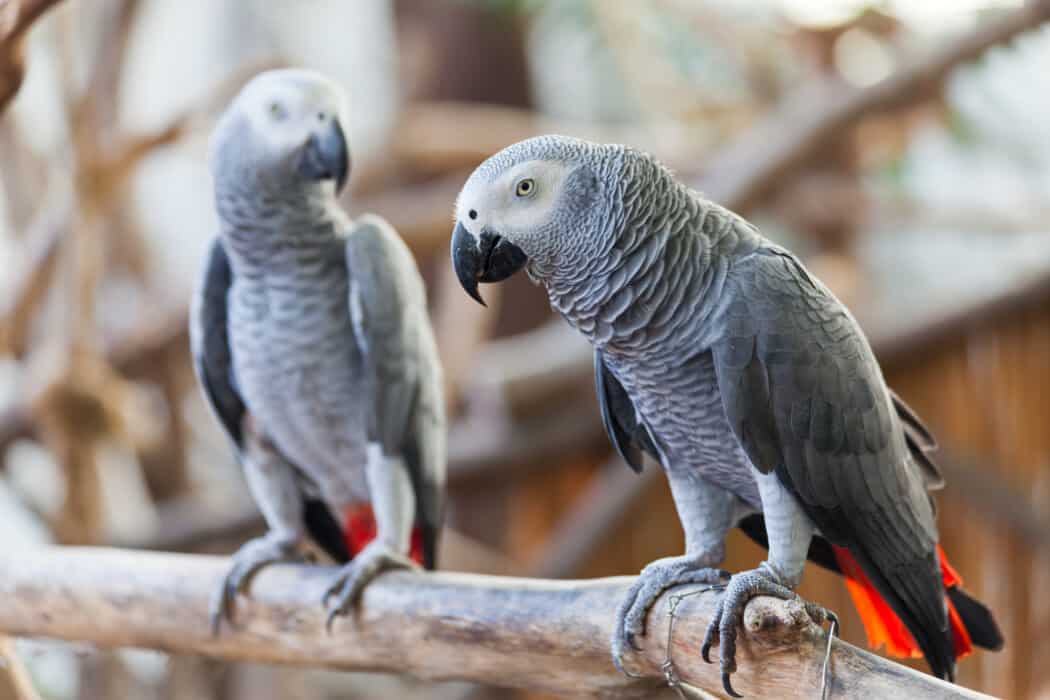
In the end, an African Grey is a universally-loved bird that would suit most owners. Remember that it’s a social yet independent bird that needs space and quiet time. Thus, it would suit a small family better than a large one with many children. With that said, it can become a great friend for a well-behaved kind.
Considering a decent African Grey lifespan of 40-60 years, it’s safe to say that the Grey is almost a lifelong pet. It’ll be by your side for long years to come, provided your care for it properly.
It’s your responsibility as an owner to provide the perfect care and check its health regularly. The vet should become your friend, and playtime with the bird a regular routine. Take notice of both the mental and physical health of your African Grey parrot.


